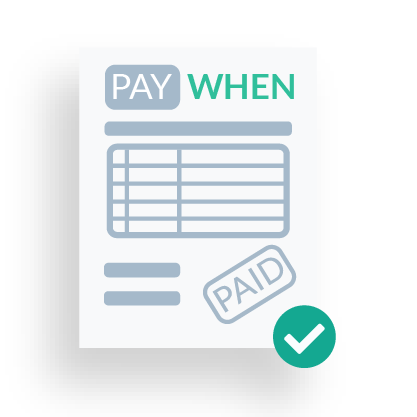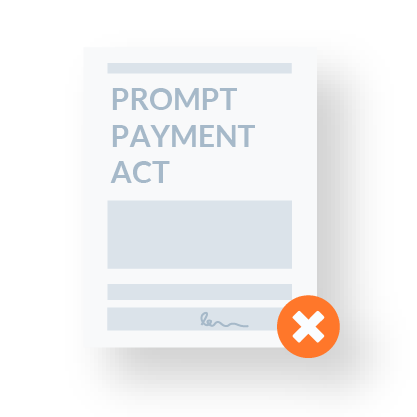
Need contract help? Put a team of legal experts in your corner.



No-lien clauses are strictly prohibited in Texas as against public policy.
![]()
Pay if paid clauses can be valid and enforceable in Texas, provided that the clause sets forth unequivocal and express agreement that the clause create a "condition precedent" to payment.

Texas allows pay when paid clauses to be enforceable with respect to time and manner of payment, but not payment itself. Sheldon L. Pollack Corp. v. Falcon Industries, Inc..

Texas prompt pay requirements for private projects cannot be modified. Payments by owners must be made within 35 days of an invoice, and once received, payment must be made to subs and suppliers within 7 days.

Texas strictly regulates retainage, including both limiting (and setting) the amount that may be withheld, and specifying strict rules and requirements regarding providing notice and making a claim for retained funds.
![]()
Pay if paid clauses can be valid and enforceable in Texas, provided that the clause sets forth unequivocal and express agreement that the clause create a "condition precedent" to payment.

In Texas, pay when paid clauses work as timing mechanisms for payment, but does not control payment itself unless the clause is explicitly clear it intends to shift risk and create condition precedent for payment, and the contractual language will not possibly allow it to be otherwise interpreted.

Texas prompt pay requirements for public projects cannot be modified. Payments by the public entity must be made within 30 days of an invoice or receipt of goods (whichever is later), and once received, payment must be made to subs and suppliers within 10 days.

Texas strictly regulates retainage, including both limiting (and setting) the amount that may be withheld, and specifying strict rules and requirements regarding providing notice and making a claim for retained funds.
A construction contract outlines each party’s obligations, rights, and remedies on a project. But although the language in specific contract clauses is typically negotiable, Texas has certain rules that govern what the agreement must include — and what is prohibited.
Keep in mind that, while Texas’ rules for construction contract terms are written into state law, the courts determine how strictly those laws should be interpreted — and those interpretations can change.
On this page, you’ll find resources, legal information, and answers to frequently asked questions about Texas’ construction contract and payment terms requirements.
While Texas generally allows construction parties to set the terms of their agreement, there are some laws that regulate specific types of contract provisions. Any contract clause that contradicts the law is invalid and unenforceable.
“No lien” clauses
Texas’ mechanics lien laws strictly prohibit no-lien clauses, i.e. the ability to waive the right to file a mechanics lien by contract as against public policy.
Contingent payment clauses
There are two types of contingent payment clauses: pay-if-paid and pay-when-paid; both of which are enforceable under Texas law.
Pay-if-paid clauses will only be enforceable if clearly, expressly, and unequivocally shifts the risk of nonpayment. Even if the clause meets these requirements, there are certain types of contracts and circumstances in which an otherwise valid pay-if-paid clause will be unenforceable. Pay-if-paid clauses are unenforceable in contracts solely for design services, civil engineering projects, and residential projects of 4 units or fewer. Additionally, Texas courts will not enforce such clauses if contractual obligations aren’t met, notice objecting the enforceability is provided, or as a defense to invalidate a lien, to name a few.
Lastly, pay-when-paid clauses are also enforceable, but will only affect the timing of payment. The obligation to pay still remains, regardless if the owner fails to pay.
Payment timing clauses
Texas’ prompt payment laws on both public and private projects are strictly enforced. The deadlines and timing of payments on any project covered under the Texas prompt pay laws cannot be modified by an agreement between the parties.
Retainage clauses
On private projects, Texas owners must withhold 10% as retainage. This cannot be altered or modified by contract. On Texas public works projects, retainage is capped at 10% for projects valued at less than $5M, and on projects valued at $5M or more, retainage is capped at no more than 5% of the contract price. These amounts cannot be increased by the contract between the parties.
Texas contracts for the improvement of residential properties have a few required disclosures and notices that must be included. This includes a Residential Disclosure Statement outlining the homeowner’s rights in case of a dispute, a list of any subcontractors and suppliers the contractor intends to use on the project, and a disclosure concerning construction defects and the notice and opportunity to repair.
Construction contracts and payment terms are highly regulated in Texas. It can be confusing to figure out when payments must be made, how to make them, and how to best protect your company from expensive problems. Here are some frequently asked questions that come up with construction contracts and payment terms on Texas jobs.
No, contractors cannot waiver lien rights by contract in Texas. The law strictly prohibits these so-called “no-lien clauses” or other such contract provisions under Tex. Prop. Code §53.286:
Notwithstanding any other law and except as provided by Section 53.282, any contract, agreement, or understanding purporting to waive the right to file or enforce any lien or claim created under this chapter is void as against public policy.
Pay-if-paid clauses
Pay-if-paid clauses in Texas are generally enforceable if the clause clearly, unequivocally, and expressly shifts the risk of nonpayment. –Gulf Construction v. Self
However, there are certain types of contracts and exceptions to the enforceability of such provisions.
Pay-if-paid clauses are unenforceable in contracts solely for: (1) design services, (2) civil engineering projects, & (3) improvements to detached single-family residences, duplexes, triplexes, or quadruplexes.
Additionally, Texas will not enforce a pay-if-paid clause under the following circumstances:
• Certain contractual obligations are not met;
• The contingent payee provides notice objecting to the enforceability;
• The contingent payor is in a sham relationship with the obligor;
• The enforcement would be unconscionable; or
• Used as a defense to invalidate mechanics lien rights.
Pay-when-paid clauses
Pay-when paid clauses are enforceable in Texas as well. However, these clauses only act as a timing mechanism, the underlying obligation to pay still exists, despite the owner’s failure to pay a general contractor.
Yes, no-damages-for-delay clauses are generally enforceable in Texas. However, there are 5 common law exceptions to the ability to use the clause as a defense for nonpayment; these include if the delay:
• Was not intended or contemplated by the parties to be within the purview of the provision;
• Resulted from fraud, misrepresentation, or other bad faith on the part of one seeking the benefit of the provision;
• Has extended for such an unreasonable length of time, that the party delayed would have been justified in abandoning the contract;
• Not specifically enumerated delays to which the clause applies; or
• Based upon active interference or other wrongful conduct, including “arbitrary and capricious acts” and “willfully and unreasoning actions,” without due consideration and in disregard of the rights of the other parties.
No, the timing of payments under both the Texas private and public prompt payment laws may not be modified by contract.
On private projects, payments from the property owner must be made within 35 days after receipt of the invoice. Once payment is received, all other payments must be made down the payment chain within 7 days.
On public projects, payments to the prime contractor must be made within 30 days of either the receipt of goods or services or the receipt of an invoice; whichever is later. Once payment is received, all other payments must be made down the payment chain within 10 days.
It depends on the type of project.
On private projects in Texas, the owner must retain 10% of the total contract price or the reasonable value of the work if there is no contract price. This cannot be modified by the agreement between the parties.
As for public projects, the amount that can be withheld as retainage differs depending on the total project value. For projects valued at under $5M, no more than 10% may be withheld. However, for projects valued at $5M or more, the amount of allowable retainage is capped at 5%. Note, that public entities may agree to release retainage upon completion of the project, or substantial completion of portions of the project.
Generally speaking, there are no specific requirements for construction contracts in Texas. However, if the contract is for the improvement of residential property, there are some requirements aimed to protect homeowners.
This includes the Texas Residential Disclosure Statement, a list of subs and suppliers, and a notice regarding defects and the notice and opportunity to cure.
→ Note: For all original contracts entered into on or after 1/1/22, the Residential Disclosure Statement must include some statutory verbiage changes. You can download an updated version of the Residential Disclosure Statement here.
Under Texas law, the statute of limitations (deadline) to initiate a lawsuit under a breach of contract claim for nonpayment is 4 years from the date the breach occurred, regardless if the contract is oral/implied or written/express. –Tex. Civ. Prac. & Rem. Code §16.004
I am the prime contractor on a residential addition. We finished the project and the customer submitted payment, but held back 10% on the project.
I am currently building a home. We terminated the contract with the builder due to material breaches of the build contract. Now, the bank with.
I just discovered that we have four active liens filed against us. How do we get copies of these liens?
Need to file a Texas mechanics lien? File your mechanics lien with Levelset, the lien experts quickly and easily. Or you can follow the 3 steps below to file a lien yourself with Levelset's free information.